![]()

![]()
Home | Introduction | Before 1700 A.D.
The Habsburg Monarchy, also known at various times as the Austrian Empire and Austria-Hungary was a complex state organized along lines very different from those of the modern nation-state. The three operating principles were the dynasty, class, and reform. The Hapsburgs used the main dynastic device of marriage to secure their lands. Ferdinand Hapsburg married Anne, the daughter of Ladislas II, King of Hungary and Bohemia. At the same time, Ferdinand's sister Mary married Ladislas's son Louis II, King of Hungary (and thus of Croatia) who died at Mohács in 1526. Because Louis' sister Anne could not by right of succession ascend the Hungarian throne, Ferdinand Hapsburg acquired Hungary, Bohemia and Croatia.
The second device or principle was Class. With such a spread and diversity of land and nationalities, the Hapsburgs allied with the powerful local aristocracy to manage their Empire. The noble families in turn became wealthy since they controlled land and free labour, they had medieval rights to meet in provincial Diets, they were exempt from taxes. They exercised administrative power in two ways: they acted as judges and decided on matters of law; as nobles they had the only right to fill administrative positions. The nobility defined themselves by Class not by ethnic nationality. The nobility exercised its other power in choosing its Ruler as was the case in the accession of Maria Theresa, subject to the conditions of the Pragmatic Sanction.
The third device was Reform, which simply meant that change for the benefit of the status quo would be tolerated, such as the religious counter reformation in the 1600's, the use of Enlightenment ideas to create an efficient but absolutist state in the 1700's, and constitutional reforms in the 1800's (which eventually accelerated the monarchy's disintegration).
In its struggles with Magyar nobles, the Habsburgs established a pattern: in times of foreign war, the crown conceded rights to the nobility, and in times of peace tried to take them away, often triggering revolts. After the decisive victory of 1699, the Habsburgs imposed direct taxes and a military draft on the Magyars, nobles and peasants alike. [Sowards]
 When
Austria went to war with France in 1703, the nobles revolted
under the leadership of Ferenc Rákóczi II, Prince of Transylvania and forced
Emperor Charles V to restore the old system of noble privileges,
in the Peace of Szatmár of 1711. This marked the last year
of major warfare in Hungary. Modern Hungarian history and the
story of the revival of the country begins at that time.
When
Austria went to war with France in 1703, the nobles revolted
under the leadership of Ferenc Rákóczi II, Prince of Transylvania and forced
Emperor Charles V to restore the old system of noble privileges,
in the Peace of Szatmár of 1711. This marked the last year
of major warfare in Hungary. Modern Hungarian history and the
story of the revival of the country begins at that time.
A sixth of Hungary's three million inhabitants died during the Szatmár revolt of 1703-1711: combined with the effect of Turkish misrule, this meant that the country was half empty. Now the country filled up with new settlers: Ruthenians, Slovaks and Germans as well as Magyars returning from the Habsburg-ruled zones.
In order to repopulate the country, the Habsburgs of Austria denationalized it methodically. The checkered ethnic pattern which had characterized pre-1920 Hungary was due to their haphazard colonizing policies. Thus in the Bánát (Transylvania), which was governed directly from Vienna from 1711 to 1779, they settled Serbs, Rumanians, Germans, Spaniards, Italians and even the French, with the result that this province which had been purely Hungarian in the 15th. century became one of Europe's ethnically most heterogeneous regions.
It is estimated that in the course of the 18th. century the Habsburgs installed or introduced into Hungary some 400,000 Serbs, 1,200,000 Germans and 1,500,000 Rumanians and thus lowered the proportion of Magyars (Hungarians) in the historic Kingdom, that had totalled 80% before the Turkish conquest, to less than 40% by 1780. In Transylvania alone the number of Rumanians rose from 200,000 to 800,000 during the 18th. century, thus exceeding the total of the Hungarian population of the Principality, although in the 16th. century the latter had still been twice as numerous as the former. This would be but one factor of the nationality question to plague the Austro-Hungarian Empire later. These figures would be used to 'prove' that Hungary could no longer claim sovereignty over her own lands simply because migrants from neighbouring countries now outnumbered Hungarians.
Another factor was due to the Emperor, Joseph II (1780-1790) who was determined that all should use the German language. This stirred nationalistic feelings amongst the Hungarians which gave rise to what was called "Magyarism". They wanted to get rid of Latin as the official language and replace it with Magyar. This incensed the other nationalities such as the Slovaks and particularly the Croats. However, this did not become law until 1844. That measure may therefore be regarded as the very beginning of the conflict of languages and nationalities and of the struggle for equality within the framework of historic Hungary. In other words it represented the break between modern Hungary and king St. Stephen's medieval Hungary. [Yves de Daruvar]
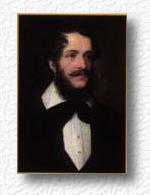 In 1848 a revolution broke out in Pest,
which eventually extended over the whole of Hungary and so Lajós Kossuth was elected Governor of Hungary.
Kossuth secured a national government for Hungary which
acknowledged the Emperor of Austria as king but was otherwise
independent of Austria. It is not clear who called in the
Russians. Was it the Rumanians of Wallachia and Moldavia? Was it
the Hapsburgs?
In 1848 a revolution broke out in Pest,
which eventually extended over the whole of Hungary and so Lajós Kossuth was elected Governor of Hungary.
Kossuth secured a national government for Hungary which
acknowledged the Emperor of Austria as king but was otherwise
independent of Austria. It is not clear who called in the
Russians. Was it the Rumanians of Wallachia and Moldavia? Was it
the Hapsburgs? 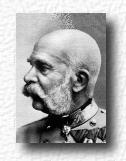 In any case, the opportunistic
Hapsburgs joined forces with the Russians against their own
subjects. Thus, Francis Josef I, the new emperor began his long
reign by playing off one part of his empire against the other.
With Russian help the Hungarians were broken in August 1849. Many Hungarians were executed. The
next twenty years were oppressive.
In any case, the opportunistic
Hapsburgs joined forces with the Russians against their own
subjects. Thus, Francis Josef I, the new emperor began his long
reign by playing off one part of his empire against the other.
With Russian help the Hungarians were broken in August 1849. Many Hungarians were executed. The
next twenty years were oppressive.
In the 19th
century little was done to improve Central Europe's political
stature. The old imperial idea survived in the form of Gesamtmonarchie (Gesamt=total,entire,whole) at
least until the historic Battle of Königgraetz in 1866 where Austria was 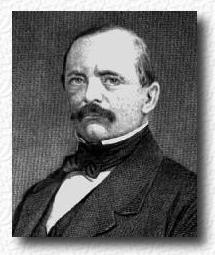 defeated by Bismarck's Prussia and
thus became a vassal state in foreign affairs of the German Reich
up to its disintegration in 1918.
defeated by Bismarck's Prussia and
thus became a vassal state in foreign affairs of the German Reich
up to its disintegration in 1918.
One lesson could successfully be drawn from the Uprising of 1848-9 and from the defeat at Königgraetz: namely, that a federation-like union between Austria and Hungary in the form of the 1867 Compromise could be successfully established. But this form of coexistence included two nations only: Austrian-Germans and Hungarians. By all means, it was a giant step forward and the Hapsburg dynasty finally gave up its outmoded doctrine of the medieval imperial idea. This dual Monarchy existed for half a century and collapsed only as a result of its war partnership with Hohenzollern Germany. The unsolved nationality questions constituted only a secondary cause relating to the disintegration of the Austro-Hungarian Monarchy. The broadening of the Compromise to include Slavs and Rumanians in a future federative system was under discussion and only the outbreak of the First World War put a stop to it.
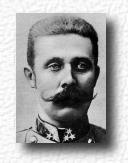 WWI was sparked off by one event, but
eventually engulfed most of the nations of the World with such
rapidity. The spark came when the Archduke Franz
Ferdinand, the
heir to the Austrian throne, and his wife were murdered by
Serbian conspirators on June 28th. 1914 at Sarajevo, the capital
of Bosnia (Austrian territory since 1908). The Archduke had
WWI was sparked off by one event, but
eventually engulfed most of the nations of the World with such
rapidity. The spark came when the Archduke Franz
Ferdinand, the
heir to the Austrian throne, and his wife were murdered by
Serbian conspirators on June 28th. 1914 at Sarajevo, the capital
of Bosnia (Austrian territory since 1908). The Archduke had  been a supporter of a new federalism
along ethnic lines. The Hapsbugs largely regarded dualism as a
transient formula and aspired to an eventual reorganization of
the Monarchy along ethnic lines, secretly hoping, that the new
structure would lend itself more easily to overall Germanization. His views had caused considerable
unrest.
been a supporter of a new federalism
along ethnic lines. The Hapsbugs largely regarded dualism as a
transient formula and aspired to an eventual reorganization of
the Monarchy along ethnic lines, secretly hoping, that the new
structure would lend itself more easily to overall Germanization. His views had caused considerable
unrest.
The Archduke also considered dividing up Hungary and giving Hungarian Transylvania to Rumania on condition that the resulting Greater Rumania join the Habsburg Empire, while Croatia and Bosnia-Herzegovina in the South would coalesce in an Illyrian State, ultimately to include Serbia, always within the framework of the Habsburg Monarchy. It was this latter project which so aroused Serb apprehensions that it may be said to have led to the fateful murder at Sarajevo. The great trick in 1914 was to corner Austria-Hungary and Germany so as to make them declare the war that Russia and France were secretly longing for, thus keeping both appearances and diplomatic advantage on their side. Hence Serbia, with secret Russian backing, was assigned the task of defying Austria beyond the limits her patience could endure. [Yves de Daruvar]
On July 23th. Austria sent an ultimatum to Serbia, which Serbia as a whole accepted, but the reservations that she made, apparently gave Austria the impression that she was not sincere. Russia had mobilised as soon as the ultimatum had been issued!
On July 27th. the British fleet was sent to its war stations.
On July 28th. Austria declared war on Serbia. Hungary was constitutionally bound to side with Austria.
 On July 29th. Russia
mobilised
against Austria on her south-western frontier, and one
source claims that Germany refused the European
conference proposed by Sir. E. Grey. Another source
claims it was Russia not Germany that had
refused!
On July 29th. Russia
mobilised
against Austria on her south-western frontier, and one
source claims that Germany refused the European
conference proposed by Sir. E. Grey. Another source
claims it was Russia not Germany that had
refused!
On July 31st. Russia mobilised against Germany on her north-western frontier. But simultaneously Austria consented to reopen dialogue with Serbia.
On August 1st. Germany mobilised declares war on Russia.
On August 2nd. Germany invaded Luxembourg. Germany requests passage through Belgium. Germany signs pact with Turkey.
On August 3rd. Germany sent ultimatum to Belgium, announcing her determination to pass through its territory, and Germany also declared war on France. Belgium refuses German request.
On August 4th. Germany invaded Belgium; England issued an ultimatum to Germany to evacuate Belgium before midnight. At midnight, since Germany had not evacuated Belgium nor begun to do so, England declared war.
In 1915, the Italians decided to join the spectacle, but did not know which side to join. First, they offered Austria-Hungary their support in exchange for the southern Austrian province of Trentino, the Dalmation islands, and the towns of Gorizia and Gradisca on the Isonzo river including full rights in Albania. This was too much for the Austrians and was promptly rejected. Italy then offered her services to the Allied Powers with even larger territorial demands on Austria-Hungary. On April 26th. 1915, Britain and France accepted those territorial demands on Austria-Hungary and signed the Pact of London with Italy.
France was also keen to make large territorial gains. On February 14th. 1917, she had signed in strictest secrecy an agreement with Russia. In return for French recognition of Russia's rights in the Polish and Baltic regions, France would be assured by the Tsar that Alsace-Lorraine would be returned to France; France would enjoy rights to the coal-rich Saar valley; and Germany would lose all rights in the Rhineland areas. The Agreement also stated that the French frontier with Germany would be drawn up at the discretion of the French government. In return France would support Russia's vast claims.
This arrangement beween France and Russia came to nought when on March 15th. 1917 the Tsar was forced to abdicate at a railway station at Pskov. Soon after the murder of the Tsar and his family at Ekaterinaburg by the Bolsheviks, Russia was effectively out of the War with the signing of the Brest-Litovosk treaty between Germany and the Soviet leaders in December of 1917. It had always been French foreign policy to ally themselves with anyone on the other side of Germany. Since Russia had turned Bolshy the French now worked feverishly to free Poland from German and Russian rule in order to create another ally on the other side of Germany under the pretense of 'liberating' oppressed minorities. Until then, the French could not have cared less about Poland and the plight of her people!
Because of the WWI, the French would finally get back German speaking Alsace-Lorraine from Germany; Germany would finally rid itself of Hungary which had limited German expansion in the past; and Russia would have its revenge against Austria-Hungary for the humiliation suffered at the Congress of Berlin in 1878, when the Great Powers at Vienna's instigation had deprived Russia of the fruits of its victory over the Turks. The last two results were rather 'hollow' victories. The victors of WWI would do the dirty work by partitioning Hungary at Trianon, France in 1920.
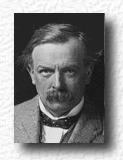 The Peace was signed on June 28th,
1919 at Versailles. The terms of which were largely worked out by
the US President Wilson, David Lloyd George of Britain, Orlando
for Italy, and Clemenceau for France. Lloyd George was shrewd and emotional, without
much knowledge of history; better at handling men than problems;
not a thinker with definite principles, but much at the mercy of
arguments couched in the language of distress. Had he had
The Peace was signed on June 28th,
1919 at Versailles. The terms of which were largely worked out by
the US President Wilson, David Lloyd George of Britain, Orlando
for Italy, and Clemenceau for France. Lloyd George was shrewd and emotional, without
much knowledge of history; better at handling men than problems;
not a thinker with definite principles, but much at the mercy of
arguments couched in the language of distress. Had he had 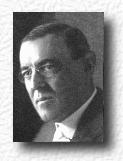 definite principles and clear and
constant views, he could have managed the French, Italians, and
the Americans at the Peace conferences and put his mark on the
treaties. He had the power to do so but not the plan. Woodrow Wilson had the principles and the plan,
but he lacked the power to persuade. He could not manage men. He
was ignorant of, or he ignored, European history.
definite principles and clear and
constant views, he could have managed the French, Italians, and
the Americans at the Peace conferences and put his mark on the
treaties. He had the power to do so but not the plan. Woodrow Wilson had the principles and the plan,
but he lacked the power to persuade. He could not manage men. He
was ignorant of, or he ignored, European history.
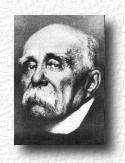 Georges Clemenceau was the best of the four leaders.
He was a Socialist who hated the middle class, the monarchy and
the Church. As a young man, he was one of the mayors of Paris who
had rebelled and risen against the French government in the
desperate, bloody and pitiless war of the commune in 1871. He
knew what he wanted and on what principles. He wanted, of course,
the territory of Alsace-Lorraine; Germany to be constrained and
militarily occupied; a strong Poland on the far side of Germany to take
the place which Russia had held in French policy and could no longer hold (prior to
this, on February 14th. 1917, France had offered to recognise Russia's rights in Polish territory!); he wanted a large
indemnity; and he wanted the French influence to be paramount in
the East.
Georges Clemenceau was the best of the four leaders.
He was a Socialist who hated the middle class, the monarchy and
the Church. As a young man, he was one of the mayors of Paris who
had rebelled and risen against the French government in the
desperate, bloody and pitiless war of the commune in 1871. He
knew what he wanted and on what principles. He wanted, of course,
the territory of Alsace-Lorraine; Germany to be constrained and
militarily occupied; a strong Poland on the far side of Germany to take
the place which Russia had held in French policy and could no longer hold (prior to
this, on February 14th. 1917, France had offered to recognise Russia's rights in Polish territory!); he wanted a large
indemnity; and he wanted the French influence to be paramount in
the East.
 At the Paris Peace conference, in
1919, French pressure to make the terms as harsh as possible
against Germany caused Lloyd George to write that the peace being
developed "ought to be dictated in the spirit of judges
sitting in a cause which does not personally engage their
interests or emotions, and not in a spirit of savage vendetta,
which is not satisfied without mutilation and the infliction of
pain and humiliation." The 1919 Treaty of Versailles and the
June 4th. Treaty of Trianon in 1920 were in effect faulty
because each carried within it causes of its own unworkability.
Each treaty was bound to cause incessant troubles, since each
violated its supposed principle of autonomy of race and language.
The US
Congress
refused to sign the Treaty of Trianon created in such a vile
spirit of hate. The United States concluded a separate peace with
Hungary on August 29, 1921.
At the Paris Peace conference, in
1919, French pressure to make the terms as harsh as possible
against Germany caused Lloyd George to write that the peace being
developed "ought to be dictated in the spirit of judges
sitting in a cause which does not personally engage their
interests or emotions, and not in a spirit of savage vendetta,
which is not satisfied without mutilation and the infliction of
pain and humiliation." The 1919 Treaty of Versailles and the
June 4th. Treaty of Trianon in 1920 were in effect faulty
because each carried within it causes of its own unworkability.
Each treaty was bound to cause incessant troubles, since each
violated its supposed principle of autonomy of race and language.
The US
Congress
refused to sign the Treaty of Trianon created in such a vile
spirit of hate. The United States concluded a separate peace with
Hungary on August 29, 1921.
Language had always been a problem with so many ethnic groups in the one area. Nationalistic fever had been stirred up by the Hapsburgs with their Germanization programs, and had spread throughout their Empire. As part of the kingdom of Hungary, the nation state of Croatia had always enjoyed a great degree of autonomy in its institutions and language up until the 19th. century. Throughout 1903 in the province of Croatia there were protests in May by Croat demonstrators against the policy of 'Magyarisation' being carried out by the Hungarian governor of the Province. Protests were against the unreasonable and exclusive use of Hungarian names and the Hungarian language on the railways of Croatia and Slavonia.
Similar unrest occurred in the Slovak-speaking regions of northern Hungary. It was alleged that villagers were shot down simply because they protested peacefully against the enforcement of Hungarian. These incidents whether true or not would be used to show how "vile the oppressive" Hungarians were. Why was the state wrong in imposing one language on its citizens? It was legitimate for the Germans. The first edict of the French Revolution did not relate to 'freedom, equality and fraternity', but rather was a decree stating that the French language should be compulsorily spoken throughout the state. No amount of protestation from the Hungarians concerning their own treatment would make any difference. The French did not care. Her fate was placed into the hands of the French-led Little Entente, which consisted of Czecho-Slovakia, Yugo-Slavia and Rumania. Hungary's predicament could not have been worse.
The yellow and red area on the map below shows visually how much territory was taken from Hungary in 1920, The Allies had violated their own principles by the dismemberment of Hungary, when 3.5 million ethnic Hungarians (Magyarok), German Hungarians, the Székely nation (a related people to the Hungarians who number around 800,000 in Transylvania) and various minorities found themselves living outside Hungary's current borders in foreign countries. The French-led Entente reduced Hungarian sovereign territory by 71.5% that is, from 325,411 Km2 to 92,833 Km2 and the Hungarian population fell from 20,886,487 to just 7,606,871 (down by 63.6%).
No one displaced by the new borders was ever asked as to which country they wanted to belong to, except in the town of Sopron (Bürgenland, Austria) where 65% voted to remain in Hungary. This single plebiscite was between two defeated nations. No such plebiscite was allowed in the areas taken by successor states such as the Bánát (Transylvania, Rumania) or Slovakia. Even before the Germanic inhabitants of the Bürgenland expressed their will to remain within Hungary other non-Magyar populations of the historic kingdom had energetically demanded the same, without being granted a hearing. Such had been the case notably of the Wends and Slovenes in the south-western corner of the country, called the Muraköz, which was ex officio annexed by Yugoslavia. The Ruthenians of Eastern Slovakia and the Schwabians of the Bánát also protested as vehemently and equally unsuccessfully to the Peace Conference against their separation from Hungary. [Yves de Daruvar]
In 1920,
Yugoslav troops had occupied the region known as Carinthia of
which Klagenfurt is the main town. The Supreme Allied Council
ordered Yugoslavia to withdraw its troops or risk Allied attack.
A plebiscite was held which turned the area over to Austria. It has been an Austrian province
to this day. Germany had been allowed, in fact was
ordered, to hold plebiscites in Schleswig-Holstein, Silesia, Bast
Prussia and the Saarland. Hungary was ruthlessly denied this right,
because her lands had already been promised to others by the
eventual victors of WWI even before the war's end. Most of the
places we, once, called 'home' are no longer in Hungary.
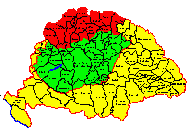 For example, Felvidék as the Hungarians called it, is now
Slovakia (red area on map at left). It was
created out of the old Hungarian counties of Pozsony, Nyitra,
Bars, Trencsén, Túrócz, Zólyom, Liptó, Árva, Szepes,
Gömör-Kishont, Sáros, Zemplén, and parts of others such as
Hont, Komarom, Esztergom, Nógrád, Abaúj-Torna.
For example, Felvidék as the Hungarians called it, is now
Slovakia (red area on map at left). It was
created out of the old Hungarian counties of Pozsony, Nyitra,
Bars, Trencsén, Túrócz, Zólyom, Liptó, Árva, Szepes,
Gömör-Kishont, Sáros, Zemplén, and parts of others such as
Hont, Komarom, Esztergom, Nógrád, Abaúj-Torna.
Transylvania became a part of the Hungarian state at the end of the 9th century, but king Saint Stephen I (996-1038) had to wage wars at the beginning of the 11th century against his own relatives to consolidate his rule there, too. Transylvania had formed an integral part of the Kingdom of Hungary up till 1572; subsequently it existed as an independent principality till 1711; thereafter it was governed directly from Vienna as a Grand Principality, entirely separate from the Kingdom of Hungary, with which it was re-united only after the 1867 Compromise. Transylvania ("land beyond the forest") is now under Rumanian administration and was not incorporated into Rumania until the signing of the Treaty of Trianon in 1920.
The Hungarian word for Transylvania is Erdély. German settlers in Hungary called it Siebenbürgen ("land of seven castles"). There are seven castles in the design of the ancient coat of arms of the Principality of Erdély. The German name "Siebenbürgen" is based on the seven bailiff (Hungarian: ispánsági) castles of Transylvania in the 11th century: Dés, Doboka, Kolozsvár, Torda, Küküllő, Gyulafehérvár and Hunyadvár (vár = castle).
Transylvania's coat of arms consists of an image of the sun and the moon (the two human figures) which represents the Székelys, an eagle representing the Magyars, and bastions (castles) representing the Saxons. These are the major historical peoples of Transylvania prior to Rumanian annexation.
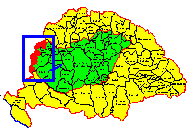 Even Austria, managed to get a piece
of her unwilling ally - the area known as Bürgenland Austria (red area on map at left)
is made up of parts of the Hungarian counties of Vas, Sopron and
Moson. The Austrian Government wanted the German inhabited parts
of these Hungarian counties. One would presume that the Germans
in these regions had been Hungarian citizens whose ancestors had migrated into
the disputed areas in the past. Relations between Austria and
Hungary sunk to a low level when Austrian history was rewritten to put substantial
blame for the collapse of the Hapsburg monarchy on the policies
of the Hungarian half of the Empire. Probably because on October
23rd. 1918, Croat troops had rebelled against the Hapsburg Empire
and seized the port of Fiume. Two days later the Hungarian
nationalist leader, Count Mihály Károlyi
declared his nation's intent to separate from Austria.
Even Austria, managed to get a piece
of her unwilling ally - the area known as Bürgenland Austria (red area on map at left)
is made up of parts of the Hungarian counties of Vas, Sopron and
Moson. The Austrian Government wanted the German inhabited parts
of these Hungarian counties. One would presume that the Germans
in these regions had been Hungarian citizens whose ancestors had migrated into
the disputed areas in the past. Relations between Austria and
Hungary sunk to a low level when Austrian history was rewritten to put substantial
blame for the collapse of the Hapsburg monarchy on the policies
of the Hungarian half of the Empire. Probably because on October
23rd. 1918, Croat troops had rebelled against the Hapsburg Empire
and seized the port of Fiume. Two days later the Hungarian
nationalist leader, Count Mihály Károlyi
declared his nation's intent to separate from Austria.
Hungarians have never accepted the
dismemberment of their country just like the 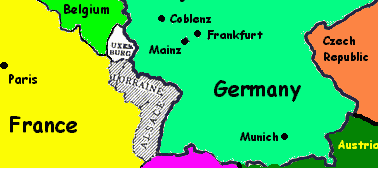 French, who never accepted the much
smaller loss of German speaking Alsace- Lorraine as fact, and kept protesting
against it for nearly 50 years, from 1871 till 1918. The tragedy
is that Hungary's guilt in 1914 in bringing about the war was
incomparably smaller than had been France's responsibility for
declaring war on Prussia, in 1870. (On 10 May 1871, as the loser,
France had to cede to Prussia all of German speaking Alsace except Belfort, and that part of Lorraine which included Strasburg and Metz.
What outrage this had caused among the French!)
French, who never accepted the much
smaller loss of German speaking Alsace- Lorraine as fact, and kept protesting
against it for nearly 50 years, from 1871 till 1918. The tragedy
is that Hungary's guilt in 1914 in bringing about the war was
incomparably smaller than had been France's responsibility for
declaring war on Prussia, in 1870. (On 10 May 1871, as the loser,
France had to cede to Prussia all of German speaking Alsace except Belfort, and that part of Lorraine which included Strasburg and Metz.
What outrage this had caused among the French!)
The Treaty of Trianon of 1920 and the treatment of Hungary comes close to what were in 1772 and 1795 the first two partitions of Poland by Russia, Austria and Prussia. They were also carried out in the spirit of depredation and with the approval of the rest of Europe. Hungary and Poland share a certain affinity: they both had protected Europe from attacks from the East; they had shared a king; there had never been any conflict beteen the two nations; and both had risen against Communist regimes. It is no coincidence that the Little Entente had insisted that the age old frontier between Hungary and Poland be removed.
In 1920, the Hungarians were not allowed to plead their case. The French would not even talk to them face to face at the peace conference, betraying their dishonourable intent to destroy the sovereign nation of Hungary. In 1917 the French were willing to throw the Poles to the Russians. Later they would 'liberate' the Poles from their oppressors and ally themselves with Poland.
On March 30, 1920, Lord Newton in the British House of Lords had said of Hungary: Their crime is that they fought against us. That is perfectly true. But the Czecho- Slovaks and the Poles and the Yugo- Slavs and all these other people whom we now greet as friends and brothers fought against us too. Hungary really is in the position of a man who has had a paralytic stroke and is being constantly kicked and cuffed by his former associates and dependents. [Montgomery]
The Germans had attracted greater sympathy from the English. Lloyd George felt that no good would come from the harsh terms imposed on Germany. He believed that forcing "the proud and intelligent" Germans to live under the rule of Poles and the Czechoslovaks would "strew Europe with Alsace-Lorraines". His comments did not go down well with the Poles, Czechs or the French. The Allies 'liberated' millions of people from so-called Austro-Hungarian oppression and at the same time condemned 3.5 million ethnic Hungarians and a large number of German Hungarians to live in Alsace-Lorraines strewn across East-Central Europe. As the Austrians and the Germans had some English sympathy while the Hungarians had none, the French were free to do as they pleased with at least one half of Austria-Hungary. Revenge was swift and mercilless
The fallacious and specious arguments used by Hungary's neighbours to justify their claims on her sovereign lands were accepted by the French without question. Because a migrant population in an area of the country outnumbers its indigenous population, does the native population lose its right to its own lands? Maybe it does. If the migrants decide to rejoin their own neighbouring country of origin can they annex large tracts of their adopted homeland in the process? They certainly can with the French in their corner! The outraged French learned nothing from the loss of German speaking Alsace-Lorraine to Prussia in 1871. Hungary, on the other hand, had learned a most bitter lesson concerning French justice and hypocrisy.
Austria had large areas taken from her also, such as Bohemia and Moravia (Czech), Galicia, Krajna, Bosnia and Bukovina but they were not core Germanic lands. Sudetenland was the only German speaking area she lost to the Czechs and that would come back to haunt Europe in WW2. Germany was punished with large reparations at French insistence, but it was found by experience that the Germans could only pay the indemnity if they had been rich and prosperous. Hence, though the indemnity was intended to cripple them, it was discovered that if they were crippled, they could not pay it, besides Germany would become a drag on the prosperity of Europe. Hence the indemnity had to be scaled down. Weren't they clever in those days?
Only the
Hungarians were singled out for extra punishment: crippling
reparations which had to be scaled back also; and huge losses of core Hungarian lands which had been settled with
non-Hungarian migrant populations in the past. The destruction of
the Austro-Hungarian
Empire in 1920
had been against the real interests of the nations of that area.
Without the interference of the victorious powers it would have
been possible to reorganize the Empire  in a democratic way as a republic of
all nations concerned, which would have blocked the way of the
expansion of the German Third Reich and of Bolshevik Russia.
in a democratic way as a republic of
all nations concerned, which would have blocked the way of the
expansion of the German Third Reich and of Bolshevik Russia.
 The tragic foreign policies of the French-led Little Entente completely poisoned the
atmosphere and
prevented the regrouping of the Danubian nations to protect their
own interests in the coming struggle. Instead of reorganizing
Central Europe as a whole, the great powers created a series of
small states which were unable to resist any outside influence
coming from either Hitler's Germany or Stalin's Russia. [Wagner]
The tragic foreign policies of the French-led Little Entente completely poisoned the
atmosphere and
prevented the regrouping of the Danubian nations to protect their
own interests in the coming struggle. Instead of reorganizing
Central Europe as a whole, the great powers created a series of
small states which were unable to resist any outside influence
coming from either Hitler's Germany or Stalin's Russia. [Wagner]
Out of desperation created by her dismemberment and the degrading way she had been treated by the victors of WWI, Hungary joined the Germans' side in World War 2 in the vain hope of regaining some of her lost territories. The fear of Communism drew Hungary's leader, Admiral Miklós Horty and his country closer to Germany. Hitler had enticed Hungary by handing back some of the lost territories. He had promised the Rumanians that Transylvania would be protected from Hungarian demands while at the same time he was saying the opposite to the Hungarians.
Faced with such a strong and ruthless German neighbour who came bearing gifts, and the indifference of the West, Hungary had little choice in the matter. In 1944, Hitler annexed Hungary and filled the country with German troops and the notoriously violent SS police. [Blackwood] There was no chance to change sides. After the war, this was irrelevant to the new victors of WW2. Hungary was subjected to a second Paris Peace Treaty more ignoble than the first. But then, when have the victors of war ever treated the vanquished nobly or fairly? And why should they? Though this is not true in the case of Japan and Germany which became economic powerhouses with US help. Hungary was thrown into the Russian sphere of influence. Even though Russia now included Hungary in the Warsaw Pact, Hungary was treated like a pariah because she had been on the Germans' side and therefore was required to pay a crippling indemnity to Russia. Hungary's machinery, assets and mineral resources were stripped and shipped off to Russia.
From the end of WW2 till 1956, the World forgot Hungary. The West abandoned her and the other little nation states they had created in 1920, all of whom now had become part of Stalin's Russia. People were being denounced and imprisoned in the early 1950's. During the reign of terror my parents had been held by the dreaded AVH (Államvédelmi Hivatal), the Hungarian political or secret police in a concentration camp from July 1952 till September 1953. The AVH was more commonly known by the citizens as the 'Avo' which was a subgroup the size of a small army such that over five years it had tortured, imprisoned and executed some 150,000 people. If they failed in keeping the people in line then the Russian Red Army units stationed in Hungary were there as backup. They were supposed to be in Hungary as 'guests', but many Hungarians saw them as occupying forces.
Stalin had
died on March 5th., 1953 and the Russian elite realised that
unless they changed some of their policies, serious internal
crises would spiral out of control. The Hungarian Workers' Party
general secretary, Mátyás Rákosi had been summoned to the Kremlin
and advised to stop forced industrialization and the campaign to
organize co-operatives, he had 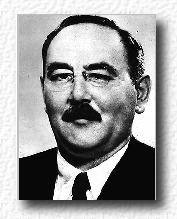 to raise the standard of living and
put an end to the use of terror. The very popular Imre Nagy was appointed Prime Minister and he
stopped the forced development of heavy industry, reduced public
spending, eased smallholders' tax- and quota burdens. Relief in
the country was tangible with the end to internment and the
forced relocation of people, and the freeing of many prisoners
including my parents.
to raise the standard of living and
put an end to the use of terror. The very popular Imre Nagy was appointed Prime Minister and he
stopped the forced development of heavy industry, reduced public
spending, eased smallholders' tax- and quota burdens. Relief in
the country was tangible with the end to internment and the
forced relocation of people, and the freeing of many prisoners
including my parents.
Russian Premier Nikita Khrushchev had made his famous 'secret speech' against Stalin in February 1956 at the 20th Communist Party Congress, which raised some hopes in the disaffected parts of the Evil Empire. In June 1956 a workers' revolt broke out in Poznan, Poland. Democratic opposition forces were gaining strength, fuelled by the increasing freedom of the Press. On October 23rd. 1956 thousands had marched to hear Imre Nagy in front of Parliament, while others had destroyed statues of Stalin. The first shots were fired on October 25th. into crowds in front of the Parliament. After weeks of negotiations between the Hungarian and Soviet leaderships things came to a head. On November 3rd. Soviet army generals tricked the Hungarian delegation led by Pál Maléter at Tököl. He was arrested and later hanged.
The Soviet Army attacked
Budapest early in the morning of November 4th. breaking the
Hungarian rebels within a few days. Imre Nagy
made his short and futile radio broadcast to the world asking for
assistance for 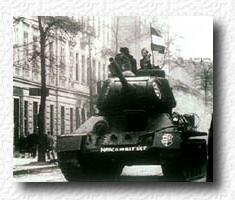 his nation. He later sought asylum
at the Yugoslav embassy. Fighting and resistance continued up
until the start of 1957 to no avail.
his nation. He later sought asylum
at the Yugoslav embassy. Fighting and resistance continued up
until the start of 1957 to no avail.
In the Revolution of 1956, Hungary showed the world that she was not finished as a nation. The Hungarians had recovered their dignity and national pride in that one act, as the West shamefully stood by and just watched. That such a small, demoralised and impoverished nation dared to revolt against Soviet tyranny and might, stunned the world on the 500th. anniversary of János Hunyadi's greatest victory against the Turks. The unrest in Poland and Hungary was a distinct annoyance for the West. Just at the beginning of a thaw - a Détente in international relations between the West and the Soviets, this inconvenience had to come along.
The West, true to its historical pattern, did nothing. The governments of Anthony Eden in London and Jean Monnet in Paris were busy with their own acts of aggression. They had been plotting in secret to invade Egypt which they did in 1956 because Egyptian President Nasser had nationalised the Suez Canal. The English and French thought they could get away with the attack on Egypt because the Soviets were preoccupied in Middle Europe with the problems in Poland and Hungary. On the other hand, World attention had been partially diverted and the Russians did as they pleased. The United States felt that sending troops into Hungary through hostile or neutral territory would have involved them in a general war.
The 1956 revolution was crushed by superior Russian forces just as in 1849. Over 200,000 Hungarians had left Hungary as a result of the suppression of the rebellion. The Hungarian rebel leaders were hanged while the puppets of Russia's government were reinstated. Thousands were put on mock trials and imprisoned or murdered. Only in 1963 were the prisoners of 1956 released. Many supporters of Communism had questioned their 'faith' after the revolution. Many illusions about Mother Russia and the Soviet way of life had been shattered both in Hungary and abroad.
Today, even though Communism is dead (except in China, North Korea and Vietnam), many Hungarians still suffer under the legacy of recent and ancient injustices committed against them in their 1100 year old turbulent and often tragic history.
Having grown up in an Anglo-Saxon environment, it is difficult for me to appreciate or understand how that history has shaped Hungary's national character, her music and rich cultural heritage. A Hungarian Frenchman, once wrote that all those historic struggles against overwhelming and nightmarish forces in the form of hordes of Mongols, Turks, Russians and so on have ended up by deeply marking the Hungarian psyche with a European as well as a National sense of mission - they saw themselves as the defenders of Western values against onslaughts from the East. [Yves Daruvar]
Although this sense of mission of the Hungarians would crystallise in their national psyche only much later, the Magyars had already served Eastern Europe by helping to turn back the great Moslem Jihads of the 7th. and 8th. centuries as subjects of the Khazar Empire. The West has conveniently forgotten all the services rendered by Hungary (and Poland) to Europe throughout history - sacrifices which induced the Holy See to call Hungary "the living rampart and the shield of Christianity" against the onslaughts of Tartars and Turks. The best of Hungary's sons had given their lives over the centuries in the defense of Europe's eastern frontier - gallant fighters of whom Eugene, Prince of Savoy had coined the sadly cynical words: "if they win, it will be our victory; if they lose, it will be their funeral".
This statement accurately defines the West's callous indifference to Hungary and her tragic fate. The need to punish those responsible for WWI was understandable, but Hungary's share of that guilt did not warrant her incomprehensibly harsh treatment. With hindsight it is easy to criticize past actions. Nevertheless, it is likely that the WWI French-led peace conference delegates sowed the seeds of WW2 with their excessive humiliation of Germany. Additionally, by creating a power vacuum in Eastern Europe in 1920 they had condemned millions of Europeans to live, suffer and die under Communist dictatorships courtesy of the West's ally, Russia.
By giving the French such a free hand, America, Britain and the other allies had let Europe down. The disservice done to Eastern Europe and her people by the victors of WWI has caused immeasurable suffering on the regional level, and it still shows no sign of abating. At the national level, rightly or wrongly, the West has treated Hungary and her people very shabbily.
Home | Introduction | Before 1700 A.D.
![]()
Last updated 4 March 1999
Maintainer T. Majlath
![]()